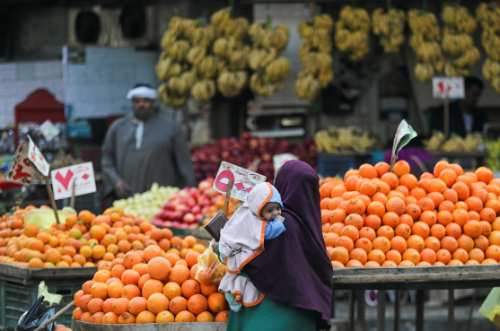Egypt’s Inflation Eases Slightly to 24% in January

TLDR
- Egypt’s annual urban consumer price inflation edged down to 24% in January from 24.1% in December
- Food and beverage prices rose 20.2% year-on-year, transport increased by 33.6%, and entertainment surged 48%
- Inflation has been high since early 2022 after foreign investors exited Egyptian treasury markets following Russia’s invasion of Ukraine
Egypt’s annual urban consumer price inflation edged down to 24% in January from 24.1% in December, data from CAPMAS showed Monday. The rate remained above the median 23% forecast from a Reuters poll of 17 analysts.
Food and beverage prices rose 20.2% year-on-year, transport increased by 33.6%, and entertainment surged 48%. Monthly inflation climbed 1.6% in January, up from zero in December, with food prices rising 2.1% and healthcare costs up 4.6%.
Inflation has been high since early 2022 after foreign investors exited Egyptian treasury markets following Russia’s invasion of Ukraine. Headline inflation peaked at 38% in September 2023 before easing. Money supply growth has contributed to rising prices, with M2 expanding 31.07% in 2024.
Daba is Africa's leading investment platform for private and public markets. Download here
Key Takeaways
Egypt’s inflation pressures remain despite recent declines. The central bank has kept interest rates high to curb price growth, but structural issues persist. The Egyptian pound’s depreciation has made imports more expensive, contributing to inflation. Egypt relies heavily on imports for food and energy, making it vulnerable to external shocks. The country also faces a foreign currency shortage, limiting its ability to stabilize the exchange rate. High inflation has eroded household purchasing power, particularly for essentials like food and healthcare. The government has sought financial support from the IMF and Gulf allies to ease economic strain. While inflation has come down from its 2023 peak, sustained price pressures indicate further policy adjustments may be needed to stabilize the economy.

Next Frontier
Stay up to date on major news and events in African markets. Delivered weekly.
Pulse54
UDeep-dives into what’s old and new in Africa’s investment landscape. Delivered twice monthly.
Events
Sign up to stay informed about our regular webinars, product launches, and exhibitions.




